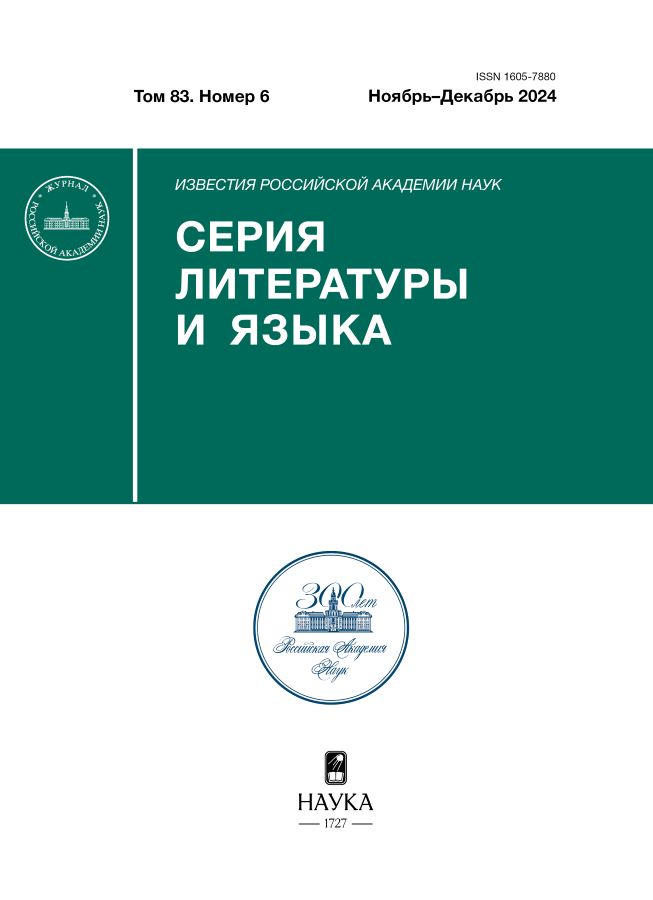The Guide to the Otherworldly: the V. F. Khodasevich’s Pretexts in the Russian-Language Works of V. V. Nabokov
- Авторлар: Ledenev A.V.1,2, Korzhova I.N.3
-
Мекемелер:
- MSU-BIT University
- Lomonosov Moscow State University
- Synergy Moscow Financial and Industrial University
- Шығарылым: Том 83, № 6 (2024)
- Беттер: 81-88
- Бөлім: Articles
- URL: https://cijournal.ru/1605-7880/article/view/657000
- DOI: https://doi.org/10.31857/S1605788024060074
- ID: 657000
Дәйексөз келтіру
Аннотация
The article examines allusions and textual borrowings in V.V. Nabokov’s prose, the source of which is the poetry of V.F. Khodasevich. Attention is focused on those borrowings that are associated with the design of the idea of otherworldliness. Since both writers did not explicitly declare their philosophical views, it is difficult to identify the ontological nature of the second reality in their works. But it is obvious that both make the subject of the image the possibility of a different, more harmonious dimension of being. In general, for Khodasevich, its achievement is possible when going beyond the visible world, and for Nabokov, when subjectively transforming reality. It is shown that the “textile” metaphor of otherworldliness as a hidden pattern or the underside of life could have been suggested to Nabokov by Khodasevich’s poem “Without Words”. We have traced the roll calls in the implementation of the motives of death-flight, transforming reflection in a mirror surface, transcendence, etc. Special attention is paid to the refraction of the cross-cutting plot about the soul from Khodasevich’s book “Heavy Lyre” in V.V. Nabokov’s novel “Invitation to a Beheading”.
Негізгі сөздер
Толық мәтін
Авторлар туралы
A. Ledenev
MSU-BIT University; Lomonosov Moscow State University
Хат алмасуға жауапты Автор.
Email: aledenev@mail.ru
Professor; Professor
ҚХР, Shenzhen; Moscow, RussiaI. Korzhova
Synergy Moscow Financial and Industrial University
Email: clean24@yandex.ru
Doct. Sci. (Philol.), Professor
Ресей, MoscowӘдебиет тізімі
- Babikov A., Shruba M. Pisma V.V. Nabokova k V.F. Khodasevichui N.N. Berberovoi (1930–1939). Pismo N. Berberovoi k V. Nabokovu [V.V. Nabokov’s Letters to V.F. Hodasevič and N.N. Berberova. A letter from N. Berberova to V. Nabokov]. Vienna Slavic Yearbook. 2017, No. 5, pp. 217–248. (In Russ.)
- Khodasevich, V. O Sirine [About Sirin]. Klassik bez retushi. Literaturnyi mir o tvorchestve Vladimira Nabokova [Classic Without Retouching. The Literary World about the Work of Vladimir Nabokov]. Moscow: NLO Publ., 2000, pp. 219–224. (In Russ.)
- Nabokov, V.V. Russkii period. Sobranie sochinenii v 5 tomakh [Russian Period. Collected Works in 5 Vols.]. St. Petersburg: Symposium Publ., 2002. (In Russ.)
- Nabokov, V.V. Kommentarii k romanu A.S. Pushkina “Evgenii Onegin” [Commentary on A.S. Pushkinʼs Novel “Eugene Onegin”]. Transl. from English. St. Petersburg: Iskusstvo-SPB Publ., Nabokov Foundation, 1998. 924 p. (In Russ.)
- Nabokov, V.V. Predislovie k angliiskomu perevody romana “Dar” (“The Gift”) [Preface to the English Translation of the Novel “The Gift”]. V.V. Nabokov: pro et contra. [V.V. Nabokov: Pro Et Contra]. St. Petersburg: Publishing House of Russian Christians. humanitarian institute, 2001. 962 p. (In Russ.)
- Levin, Yu.I. O poezii Vl. Khodasevicha [On the Poetry of V. Khodasevich]. Levin, Yu.I. Izbrannyetrudy. Poetika. Semiotika [Selected Works. Poetics. Semiotics]. Moscow: Languages of Russian culture Publ., 1998, pp. 209–267. (In Russ.)
- Dolinin, A. Istinnaia zhizn pisatelia Sirina [The Real Life of the Writer Sirin]. St. Petersburg: Akademicheskii proekt Publ., 2004. 400 p. (In Russ.)
- Syrovatko, L.V. Tiazhelyi dar. Kontseptsiia tvorchestva V. Khodasevicha i motiv “vstrechi s nebozhitelem” u V. Nabokova [A Heavy Gift. The Concept of V. Khodasevich’s Creativity and the Motive of V. Nabokov’s “Meeting with the Celestial”]. Voprosy literatury [Topics in the Study of Literature]. 2010, No 3, pp. 95–122. (In Russ.)
- Khodasevich, V.F. Sobranie sochinenii v 4 t. T. 1 Stikhotvoreniia. Literaturnaia kritika 1906–1922 [Collected Works in 4 vols. Vol. 1 Poems. Literary Criticism 1906–1922]. Moscow: Soglasie Publ., 1996. 592 p. (In Russ.)
- Nabokov, V.V. Sobranie sochinenii v 4 t. [Collected Works in 4 Vols.]. Moscow: Pravda Publ., 1990. (In Russ.)
- Nabokov, V.V. Details of a Sunset and Other Stories. New York: McGraw-Hill, 1976. 182 p.
- Bocharov, S.G. “Pamiatnik” Khodasevicha [“Monument” of Khodasevich]. Bocharov S.G. Siuzhety russkoi literatury [Plots of Russian Literature]. Moscow: Languages of Russian culture Publ., 1999, pp. 415–471. (In Russ.)
- Nabokov, V.V. Stikhotvoreniia. Seriia “Vsemirnaia biblioteka poezii” [Poems. The World Poetry Library Series]. Rostov-on-Don: Feniks Publ., 1998. 480 p. (In Russ.)
- Aleksandrov, V.E. Nabokov i potustoronnost: metafizika, etika, estetika [Nabokovʼs Otherworld]. Translated from English by N.A. Anastasiev. St. Petersburg: Alateya Publ., 1999. 313 p. (In Russ.)
- Davydov, S. “Teksty-matreshki” Vladimira Nabokova [“Matryoshka Texts” by Vladimir Nabokov]. St. Petersburg: Kirtsideli Publ., 2004. 158 p. (In Russ.)
- Kozlova, S.M. Utopija istiny i gnoseologija otrezannoj golovy v “Priglashenii na kazn” [Utopia of Truth and the Epistemology of a Severed Head in “Invitation to a Beheading”]. Zvezda [The Star]. 1999, No. 4, pp. 184–189. (In Russ.)
- Platon. Polnoe sobranie tvorenii Platona v 15 t. T. 5. Pir. Fedr [The Complete Collection of Platoʼs Works in 15 Vols. 5. Feast. Fedr]. Transl. by S.A. Zhebelev. St. Petersburg: Academia Publ., 1922. 182 p. (In Russ.)
- Skonechnaia, O. Priglashenie na kazn. Primechaniia [“Invitation to a Beheading”. Notes]. Nabokov, V.V. Russkii period. Sobranie sochinenii v 5 t. T. 4. [Russian Period. Collected Works in 5 Vols.]. St. Petersburg: Simpozium Publ., 2002, pp. 603–634. (In Russ.)
Қосымша файлдар









